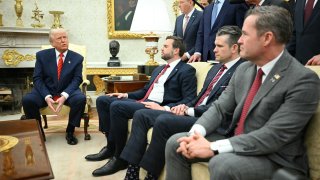
US President Donald Trump speaks to the press as he meets with NATO Secretary General Mark Rutte in the Oval Office of the White House in Washington, DC, on March 13, 2025 as, seated from L to R, Vice Presient JD Vance, Defense Secretary Pete Hegseth and National Security Advisor Mike Waltz.
- President Donald Trump said he was not upset with national security advisor Michael Waltz for reportedly adding a journalist to a Signal thread with top officials discussing military plans.
- "Michael Waltz has learned a lesson, and he's a good man," Trump told NBC News in a phone call when asked about the bombshell revelation published in The Atlantic a day earlier.
- The Atlantic's editor in chief, Jeffrey Goldberg, was added to a Signal thread called the "Houthi PC small group," which included Defense Secretary Pete Hegseth.
President Donald Trump on Tuesday said he was not upset with national security advisor Michael Waltz after he reportedly added a journalist to a Signal text thread in which top officials discussed pending military strikes.
"Michael Waltz has learned a lesson, and he's a good man," Trump told NBC News in a phone call when asked if he still had confidence in his top national security aide.
Trump blamed a lower-level staffer when asked how The Atlantic's editor in chief, Jeffrey Goldberg, came to be included in a text thread that included Vice President JD Vance and Defense Secretary Pete Hegseth.
Get top local stories in Southern California delivered to you every morning. Sign up for NBC LA's News Headlines newsletter.
"It was one of Michael's people on the phone. A staffer had his number on there," the president said.
Trump doubled down later Tuesday, telling reporters during a White House meeting that Waltz "will continue to do a good job" and that he does not need to apologize.
Asked if anyone would be fired over the incident, Trump said, "We've pretty much looked into it."
Money Report
Waltz, sitting near Trump in the meeting, denied knowing Goldberg and said that his team is "looking into and reviewing how the heck he got into this room."
Both men lobbed insults at Goldberg, whose reporting — especially his 2020 article accusing Trump of calling slain U.S. soldiers "suckers" and "losers" — has long drawn the president's ire.
Anna Bross, a spokeswoman for The Atlantic, said in a statement to NBC on Tuesday afternoon that the attacks "follow an obvious playbook by elected officials and others in power who are hostile to journalists and the First Amendment rights of all Americans."
"Our journalists are continuing to fearlessly and independently report the truth in the public interest," Bross said.
Goldberg revealed in a bombshell article Monday that his number on Signal, an encrypted messaging app, had been added on March 13 to a chat thread called the "Houthi PC small group."
The thread showed participants discussing and debating plans related to U.S. bombing attacks on Houthi targets in Yemen, which were ultimately carried out on March 15.
The participants' names appeared to match those of top-level Trump administration officials, including Vance, Hegseth and Waltz, as well as Secretary of State Marco Rubio, Director of National Intelligence Tulsi Gabbard, CIA Director John Ratcliffe and Treasury Secretary Scott Bessent.
Goldberg declined to reveal some of the contents of the texts, including the name of one person he described as an "active intelligence officer." Goldberg also declined to detail a post from Hegseth that included what the journalist called "operational details of forthcoming strikes on Yemen, including information about targets, weapons the U.S. would be deploying, and attack sequencing."
A National Security Council spokesman confirmed the authenticity of the Signal group to The Atlantic, saying, "We are reviewing how an inadvertent number was added to the chain."

At an annual hearing on worldwide threats before the Senate Intelligence Intelligence Committee on Tuesday morning, Gabbard said she was "not going to get into the specifics" when aggressively questioned by the panel's top Democrat, Sen. Mark Warner of Virginia.
Gabbard and Ratcliffe both testified that the Signal texts did not include any classified information.
Warner, after slamming the incident as the latest example of "sloppy, careless, incompetent behavior" by the Trump administration, pushed the officials to share the texts with the committee.
Gabbard and Ratcliffe did not commit to doing so. But when Sen. Ron Wyden, D-Ore., asked if she would cooperate with an audit to confirm that she has not participated in any other group chats involving classified information, Gabbard said she has "no objection."

Ratcliffe, asked the same question, said he would "comply with any follow up that the National Security Council would deem appropriate."
When was asked by Sen. Jon Ossoff, D-Ga., if he agreed that the incident was a "huge mistake," Ratcliffe said, "No."
Trump and his officials have pushed back on the story, disputing Goldberg's characterization of the thread as "war plans" and launching personal attacks on Goldberg himself.
"Nobody was texting war plans. And that's all I have to say about that," Hegseth said Monday afternoon.
Goldberg responded bluntly. "That's a lie. He was texting war plans, he was texting attack plans," he said of Hegseth in a CNN interview Monday night.
White House press secretary Karoline Leavitt echoed the claim that "no 'war plans' were discussed," and denied that any classified material was sent to the Signal thread.
In an X post later Tuesday morning, Leavitt said Trump "continues to have confidence in his national security team, including Mike Waltz."
Criticism over the texting controversy was not limited to Democrats.
Rep. Don Bacon, R-Neb., said "that's baloney" when asked by reporters about the White House's denial that the thread with Goldberg involved war plans.
"Just be honest and own up to it," Bacon said, adding, "It's a fact" that classified information was included.
"I think it's pretty clear," he said.






